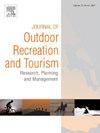A study of the effect of cycling experience on place attachment from the embodiment theory perspective
IF 3.6
3区 管理学
Q1 HOSPITALITY, LEISURE, SPORT & TOURISM
Journal of Outdoor Recreation and Tourism-Research Planning and Management
Pub Date : 2025-04-05
DOI:10.1016/j.jort.2025.100881
引用次数: 0
Abstract
Under the new mobility paradigm, bicycles are no longer just for daily commuting, and greenway cycling has evolved into a new tourism and leisure activity. Compared to other types of tourism experiences, tourists' outdoor leisure cycling experiences are characterized by a higher degree of embodied cognition. As people interact with spaces and places, different physical experiences and perceptions are generated, which in turn lead to emotional judgments about the place. Therefore, we used a questionnaire to survey and analyze cyclists (265 people) in Dongxiaokou Forest Park. The structural equation model analysis was conducted using AMOS 24.0 software. Drawing on the embodiment perspective and the expansive construction theory of positive emotions, this study investigates the impact of cyclists' embodied experiences on place attachment. The following conclusions are drawn: (1) Cyclists' embodied experience can be categorized into two dimensions: physical experience and psychological experience. (2) The embodied experience has a significant effect on the positive emotions of tourists. (3) The psychological dimension of embodied experience has a direct effect on place attachment. (4) Positive emotions have a mediating role in the relationship between embodied experience and place attachment. (5) Those who cycled more often showed higher levels of place attachment, and those who had a cycling companion had a stronger cycling experience than those who cycled alone.
体现理论视角下骑车体验对地方依恋的影响研究
在新的出行模式下,自行车不再仅仅是日常通勤的工具,绿道骑行已经演变为一种新的旅游休闲活动。与其他类型的旅游体验相比,游客的户外休闲骑行体验具有更高的具身认知程度。当人们与空间和地点互动时,会产生不同的物理体验和感知,从而导致对地点的情感判断。因此,我们采用问卷调查法对东小口森林公园265名骑行者进行调查分析。采用AMOS 24.0软件进行结构方程模型分析。本研究运用具身观和积极情绪的扩展建构理论,探讨骑车者的具身体验对地方依恋的影响。结果表明:(1)骑自行车者的具身体验可分为身体体验和心理体验两个维度。(2)具身体验对游客的积极情绪有显著影响。(3)身具体验的心理维度对地点依恋有直接影响。(4)积极情绪在身具体验与地方依恋的关系中起中介作用。(5)经常骑车的人表现出更高的地方依恋水平,有同伴的骑车者比独自骑车的人有更强的骑车体验。
本文章由计算机程序翻译,如有差异,请以英文原文为准。
求助全文
约1分钟内获得全文
求助全文
来源期刊

Journal of Outdoor Recreation and Tourism-Research Planning and Management
HOSPITALITY, LEISURE, SPORT & TOURISM-
CiteScore
6.70
自引率
5.30%
发文量
84
期刊介绍:
Journal of Outdoor Recreation and Tourism offers a dedicated outlet for research relevant to social sciences and natural resources. The journal publishes peer reviewed original research on all aspects of outdoor recreation planning and management, covering the entire spectrum of settings from wilderness to urban outdoor recreation opportunities. It also focuses on new products and findings in nature based tourism and park management. JORT is an interdisciplinary and transdisciplinary journal, articles may focus on any aspect of theory, method, or concept of outdoor recreation research, planning or management, and interdisciplinary work is especially welcome, and may be of a theoretical and/or a case study nature. Depending on the topic of investigation, articles may be positioned within one academic discipline, or draw from several disciplines in an integrative manner, with overarching relevance to social sciences and natural resources. JORT is international in scope and attracts scholars from all reaches of the world to facilitate the exchange of ideas. As such, the journal enhances understanding of scientific knowledge, empirical results, and practitioners'' needs. Therefore in JORT each article is accompanied by an executive summary, written by the editors or authors, highlighting the planning and management relevant aspects of the article.
 求助内容:
求助内容: 应助结果提醒方式:
应助结果提醒方式:


